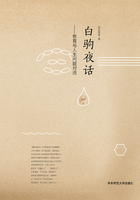Finding enough meat was a problem for primitive① man. Keeping it for times when it was scarce② was just as hard. Three ways were found to keep meat from spoiling:salting, drying, and freezing.
People near salty waters salted their meat. At first they probably rubbed③ dry salt on it, but this preserved only the outside. Later they may have pickled④ their meat by soaking⑤ it in salt water.
In hot, dry lands, men found that they could eat meat that had dried while it was still on the bones. They later learned to cut meat into thin strips⑥ and hang it up to dry in the hot air.
Men in cold climates found that frozen meat did not spoil. They could leave their meat outside and eat it when they pleased.
① primitiveadj. 原始的;远古的;早期的
② scarceadj. 缺乏的;不足的
③ rubv. 擦,磨擦;使相擦[(+against/on)]
④ picklev. (用盐卤或醋)腌制,将……做成泡菜
⑤ soakv. 浸泡,浸渍[(+in)]
⑥ stripn. 条,带;细长片
储存肉的三种方法
对原始人类来说,获得充足的肉是件难事,而把肉类储存到缺肉的时令也同样不容易。人们找到了防止肉类变腐的三种办法:盐腌、风干和冷冻。
靠近咸水地带的居民用盐腌肉。起先,他们可能是把干盐擦在肉上,但这只能使肉的外部不腐。后来,他们也许就改用咸水浸泡的办法来腌肉了。
在炎热、干燥的地方,人们发现他们可以食用已经变干、但仍连在骨骼上的肉。后来,他们学会把肉切成薄条,悬挂起来,让它在炎热的空气中变干。
生活在寒冷气候下的人们则发现冻肉不腐。他们可以把肉置于室外,高兴时随时可吃。















